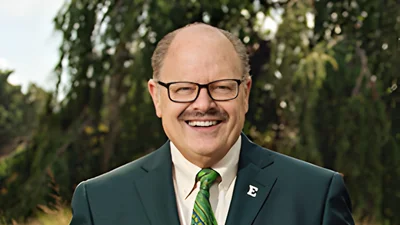Santa J. Ono, Ph.D. President at University of Michigan - Ann Arbor | LinkedIn
Santa J. Ono, Ph.D. President at University of Michigan - Ann Arbor | LinkedIn
A range of technical and policy approaches are being considered to mitigate global climate change. Whether and how these approaches are prioritized or abandoned often depends directly on public approval.
For one such technology—carbon capture and utilization (CCU)—public support depends on which aspect of the technology is being considered and which people are considering it, according to a new study conducted by researchers from the University of Michigan and other institutions.
Led by Kaitlin Raimi, an associate professor at the Ford School of Public Policy, the research explores how the U.S. public perceives CCU as a potential aid in reducing emissions. The emerging mitigation technology captures carbon dioxide from the atmosphere and reuses it to produce commercial products, such as fuels, concrete, and plastics.
By measuring support for three different dimensions—its use overall, local facility development, and products—the study found that Americans had an overall positive perception of the technology.
Nevertheless, there remained a certain nuance to this general perception, as many were less supportive of the technology being produced at local facilities than they were in an abstract sense. Many believed that it had more potential to benefit the economy rather than improve health and slow climate change.
The complex process of creating CCU consumer products for economic growth requires infrastructure that would alter land use. This, as well as potential carbon dioxide leakage from these products, has concerned participants in past studies. This study suggests that these concerns may be heightened for some communities.
While those who considered themselves environmentalists were most supportive, individuals who believed that technology tampers with the natural processes of the world were less likely to support it.
The study also considered how beliefs varied across race and ethnicity, gender, and social identity in an attempt to better understand the intricacies of the general consensus. It found racial minorities have a higher concern about local environmental risks of the technology than white Americans, which the researchers estimate may be due to their greater exposure to the direct consequences of environmental degradation.
Additionally, it uncovered that men supported CCU more than women and were more optimistic about the economic and health benefits of the technology.
“Our work suggests that the U.S. public—or at least segments of that public including racial and ethnic minorities—may perceive environmental tradeoffs in which CCU’s climate benefits may come at the costs of other environmental outcomes such as land use changes for CCU infrastructure or local air pollution caused by leaked CO2,” the researchers wrote in the study. “It is therefore crucial to include diverse stakeholder communities in any decision-making about CCU, whether about siting new industrial facilities or offering new CCU products in the market.”
Overall, the study emphasizes that gaining widespread approval of emergent technologies is a complicated process that depends on multiple factors, including economic, political, and social acceptance by markets, policymakers, the public, and local communities.
The U.S. currently is doing less than its European counterparts to mitigate emissions despite having the second highest emissions by region in the world. Furthermore, Americans remain less concerned about climate change in general and more polarized on the issue itself, creating a general unawareness about and apathy around finding potential solutions according to the study.
The study aims to foster more awareness about climate change mitigation measures particularly those involving CCU. Its goal is to create a dialogue between experts and the general public that allows for collective inclusive problem-solving in order to fight more effectively against climate change.
Raimi’s co-authors were P. Sol Hart a professor in U-M Department of Communication and Media; Soobin Choi a U-M doctoral student in communications; Kimberly S Wolske a research associate professor at University Chicago
The researchers received funding from Global CO2 Initiative at U-M College Engineering.






 Alerts Sign-up
Alerts Sign-up